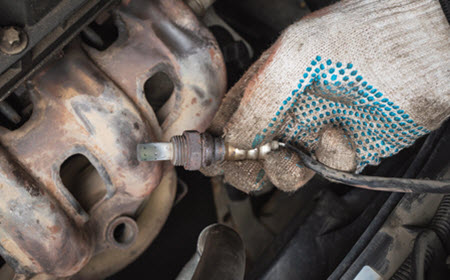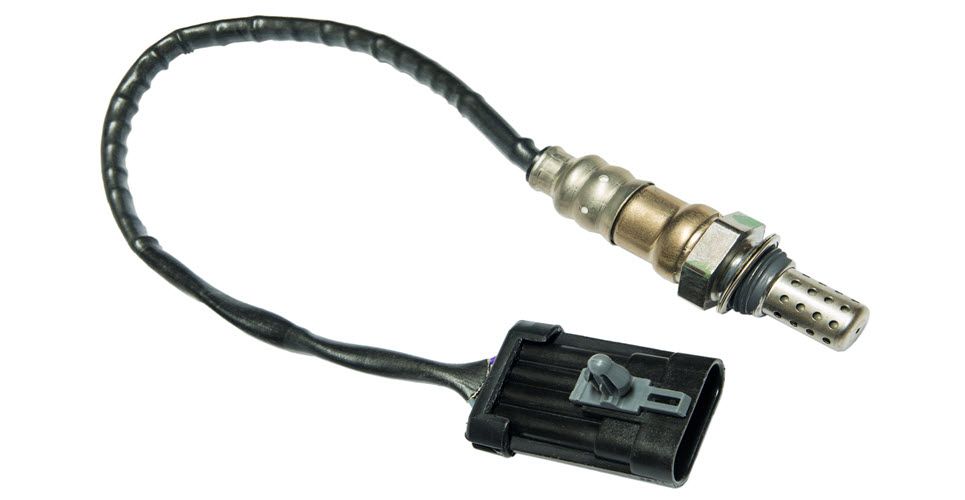Over the years, cars have gotten smarter. Nowadays, they’re able to run diagnostic checks on themselves in real-time. Their onboard tests can evaluate your vehicle with a network of sensors. This blog post focuses on one of these sensors: the oxygen sensor. As you read through, you’ll learn about its ability to perform different functions in your Volkswagen. Let’s start by discussing how it works!
Oxygen Sensor: How Does It Work?
In a nutshell, an oxygen sensor can be defined as a small electronic device designed to perform a very specific task — analyzing the oxygen content. It makes use of a pair of electrodes to evaluate differences in O2 concentration in both ambient air and exhaust gas. Almost all cars, including your Volkswagen, come equipped with at-least two oxygen sensors: one sits upstream, between the intake manifold and catalytic converter, while the other sits downstream, next to the end of the catalytic converter. Both of these sensors report to the engine control unit (ECU). Data provided by the first one aids the computer in regulating the air-to-fuel proportion inside the combustion chamber, whereas the second one makes it possible for the ECU to keep track of the catalytic converter’s overall health.
Oxygen Sensor: Why Your Volkswagen Need One?
#1- Enhance engine efficiency
Since the introduction of oxygen sensor, car engines have become more efficient. This intricate part has enabled the engine management computer to keep track of the residual oxygen content in the exhaust emissions. Simply meaning, the oxygen sensor can detect if your Volkswagen is running rich or lean, as well as stabilize the air-to-fuel proportion to enhance engine efficiency.
#2- Optimal fuel consumption
The EMC relies on a bunch of sensors, including the oxygen sensor, to decide how much air and fuel the engine should receive at any given moment for optimal fuel consumption. If it’s malfunctioning, your Volkswagen will encounter a myriad of drivability problems, including: cylinder misfire, stalling, no start issue, and so on and so forth. In turn, your engine will consume fuel at an alarming rate.
#3- Reducing emissions
The combustion of fossil fuels inside the engine generates an array of particulate and gas emissions. To meet vehicular emissions standards, modern cars are equipped with a slew of different control instruments. For instance, the oxygen sensor plays a crucial role in reducing emissions. If it’s not doing it’s job, you may fail a SMOG emissions inspection.
When To Replace Your VW’s Oxygen Sensor
Because it’s an electrical part made of wires and electrodes, the oxygen sensor is susceptible to all sorts of problems and may malfunction prematurely. If not replaced on time, a defective oxygen sensor, may contribute to expensive repairs down the road. When in doubt, look at these signs below to help you diagnose a defective oxygen sensor in your Volkswagen…
Sign #1- Check engine light
One possible sign of a faulty oxygen sensor is your check engine light; it may start flashing if it’s not working. In addition to the warning indicator, the onboard diagnostic system will store an error code in the fault memory to make it easier for you to trace the issue to its root and have it fixed.
Sign #2- Performance issues
Although the oxygen sensor may seem like an insignificant part, it helps the engine management computer to perform various essential tasks. If it gives up, the engine will have a hard time operating. Worse case scenario, it may even stop working in the middle of nowhere.
Visit Hagan’s Motor Pool for Maintenance and Repairs
As stated above, oxygen sensors help your engine  management computer (EMC) with many different things. At Hagan’s Motor Pool, we know how significant an oxygen sensor is for the overall performance of a Volkswagen. We are also aware of the range of issues that a person has to deal with should it die. Our service center at Rochester, NH is ready to solve any sensor related issues. We also proudly serve VW owners in the neighboring Alton, Barrington, Berwick, and Dover cities. Looking for quick, affordable, and excellent service? Visit Hagan’s Motor Pool for all your maintenance and repairs today!
management computer (EMC) with many different things. At Hagan’s Motor Pool, we know how significant an oxygen sensor is for the overall performance of a Volkswagen. We are also aware of the range of issues that a person has to deal with should it die. Our service center at Rochester, NH is ready to solve any sensor related issues. We also proudly serve VW owners in the neighboring Alton, Barrington, Berwick, and Dover cities. Looking for quick, affordable, and excellent service? Visit Hagan’s Motor Pool for all your maintenance and repairs today!

